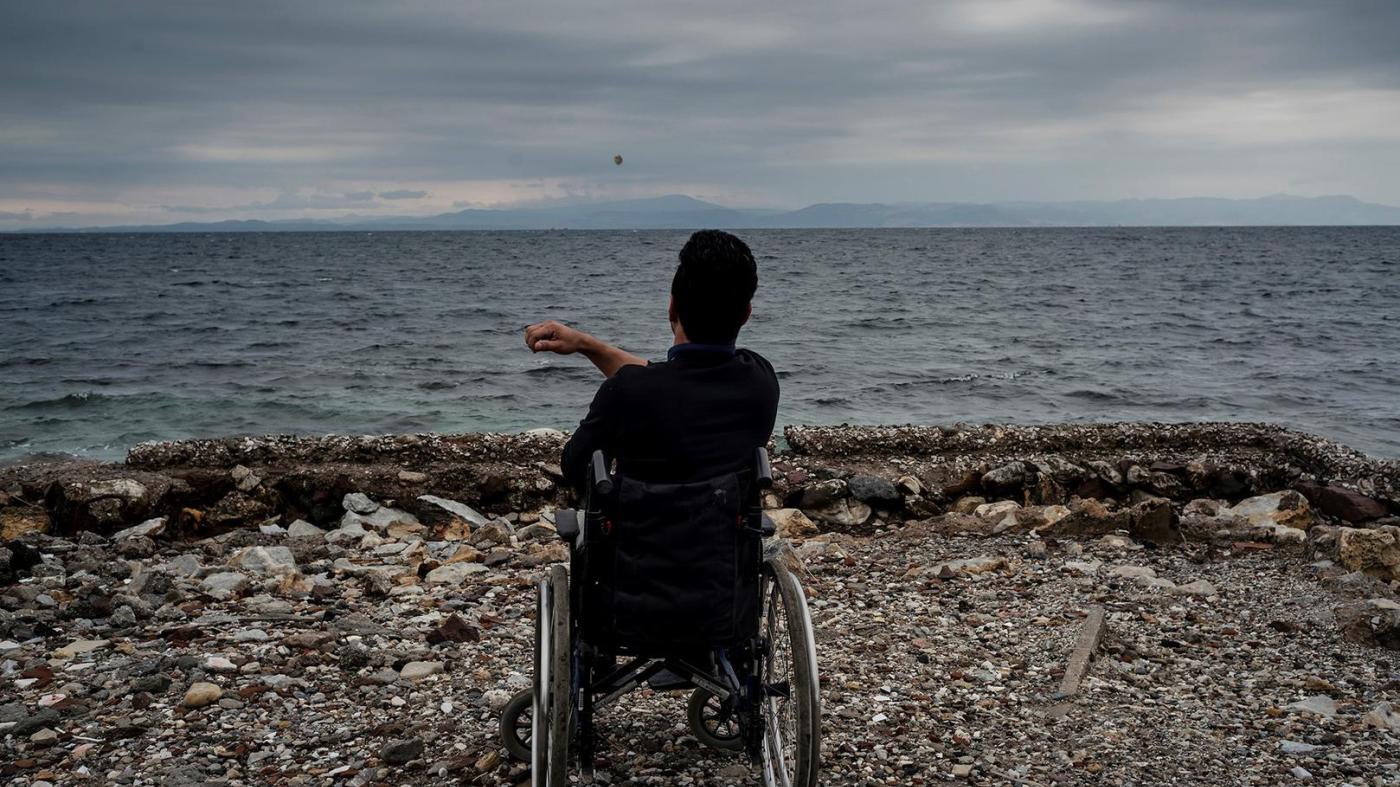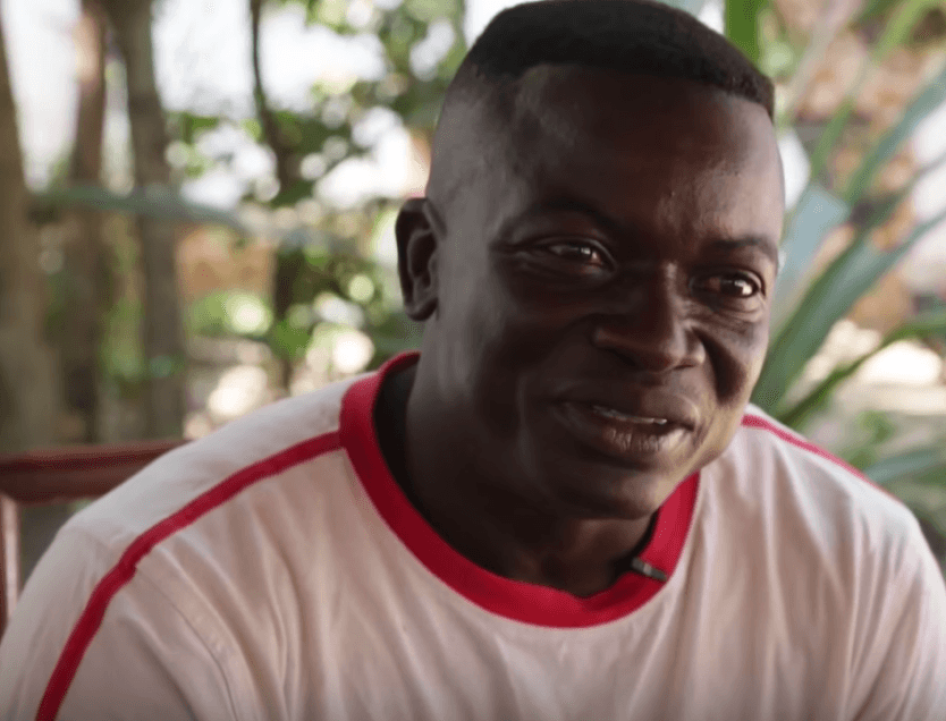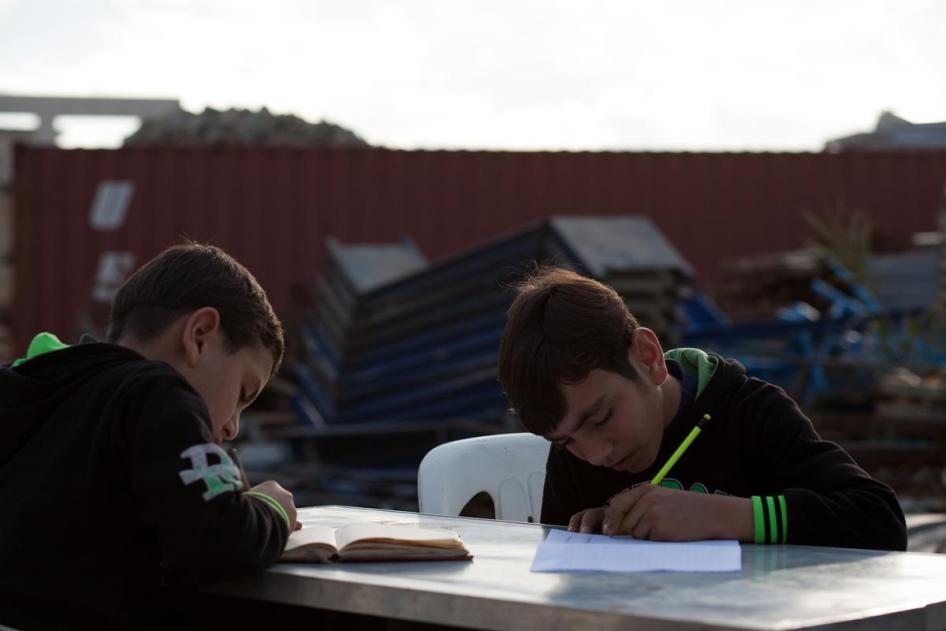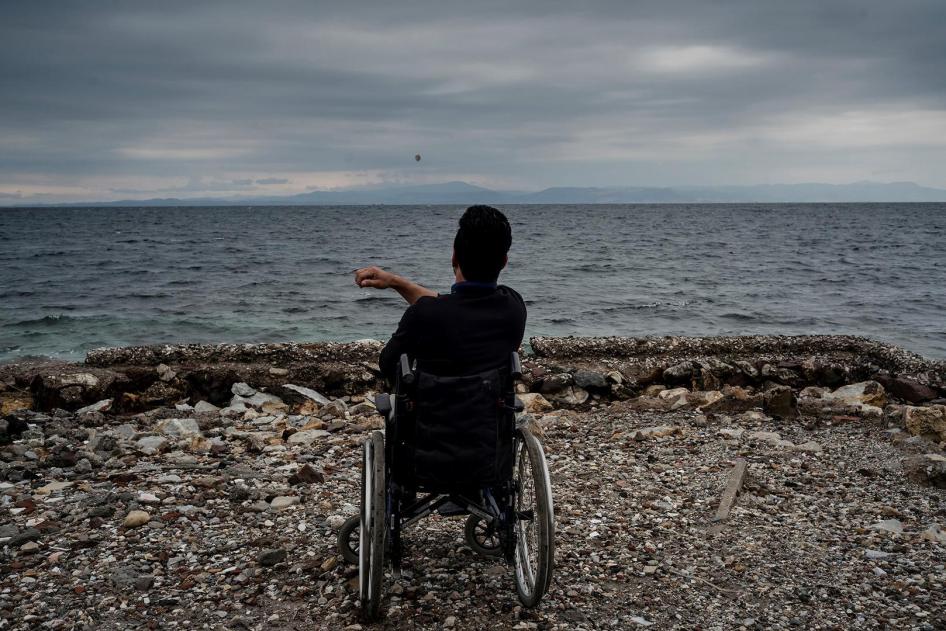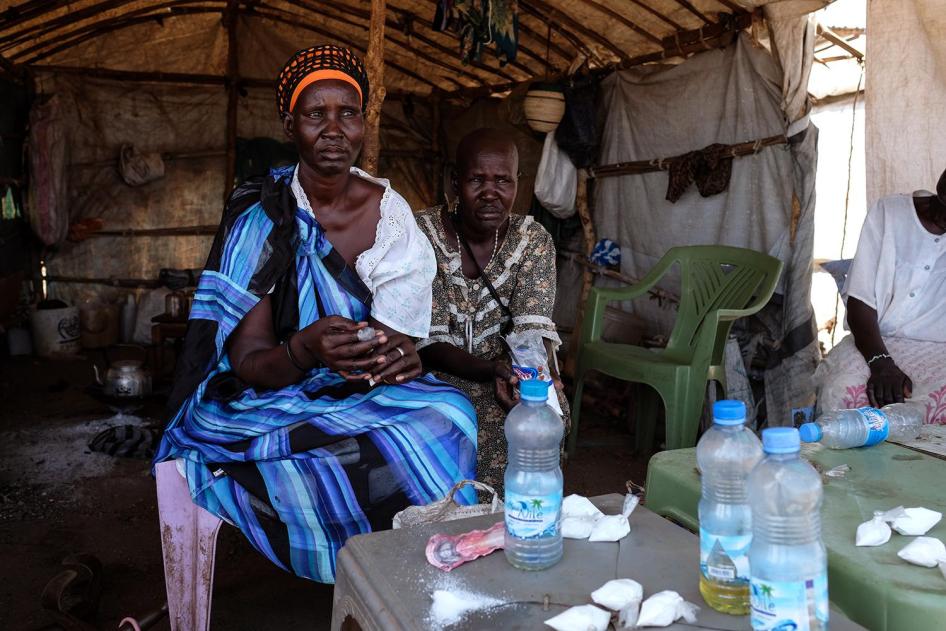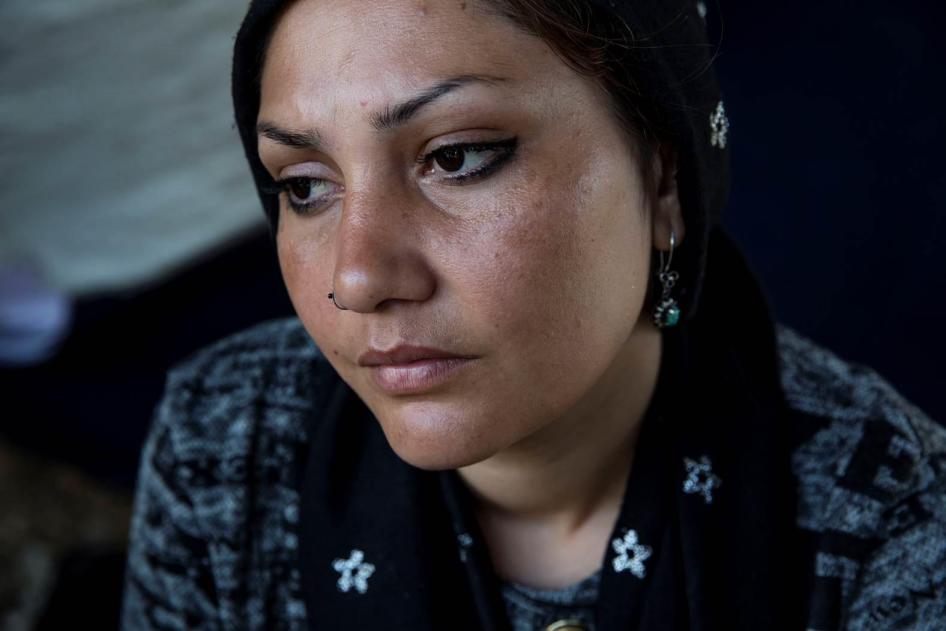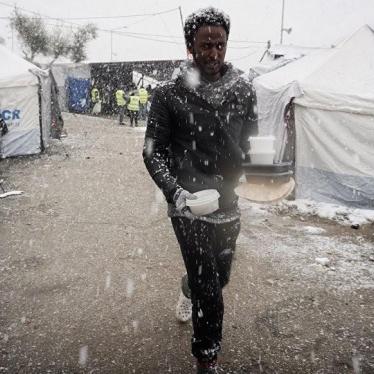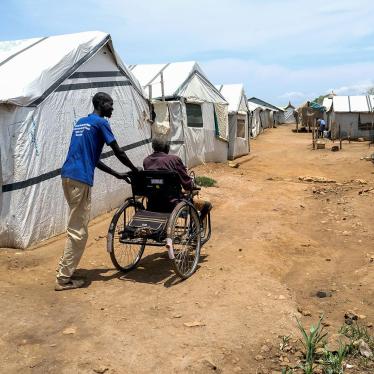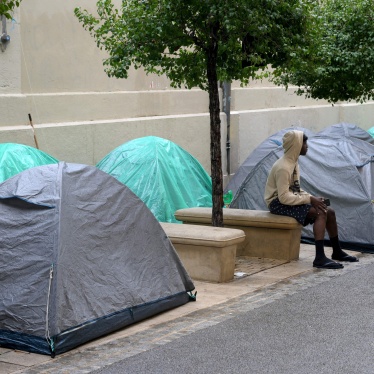Simplice – Central African Republic
The frustration burned in Simplice Lenguy’s eyes as he spoke about the situation faced by people with disabilities since conflict erupted in the Central African Republic.
In 2015, sitting near some of the tumble-down tents and the frames of old aeroplanes that made up the M’Poko camp in Bangui before it was razed, Simplice explained how he organized the camp’s forgotten residents – those with disabilities – to try and get some of their needs met.
“People with disabilities have a different life here because their disability is doubled once they fled from their house to the M’Poko camp,” he told Human Rights Watch researchers. “They left behind all the little tricks they had learnt to survive,” he said, adding that people who at home had used tricycles to get around now had to drag themselves around on the rough ground – compounding the problems they faced.
“[A person with disabilities] is crawling like an animal to go where he wants to go. That’s disgraceful,” he said.
Simplice, who can’t walk without a cane or crutches, didn’t initially want to run from the fighting, fearing he would slow his family down. But his wife persuaded him to come with her and their two children, and he eventually made it to M’Poko.
As many people with disabilities have now left displacement camps and gone back to their communities, Simplice’s fight continues.
“People with disabilities continue to face many difficulties. They should be supported in going home. They have lost their homes and everything that used to allow them to live. Before fleeing to the camp, they had small businesses and were able to feed their families. With the conflict, they have lost all their capital and are left without anything. Funds need to be set up to help develop income-generating activities to enable people with disabilities to start a new life.”
Wa’el – Lebanon
Being uprooted from your home and forced to flee across borders to survive would be difficult for any child. But for 13-year-old Wa’el, who lives with a rare genetic condition, escaping war-torn Syria for Lebanon cost him something very precious – his education.
Kawthar, Wa’el’s mother, speaks passionately about her children’s education, but tears shine in her eyes as she discusses Wa’el.
“I have a nightmare about his future. I see my son sitting in a corner and not doing anything at all. Nothing at all.”
Wa’el has Hunter Syndrome, a rare genetic condition that can lead to physical and intellectual disabilities.
In Lebanon, many refugee children with disabilities have been denied places in public schools. Schools often do not meet the needs of children with disabilities, and those that accept them often fail to ensure children with disabilities are able to learn alongside their peers.
Kawthar was able to enroll Wa’el along with her other children, but she said staff would not even take the most basic steps to help him learn – such as letting him sit at the front of the class where it was easier to concentrate.
“It’s a small request,” Kawthar said.
Speaking at the start of 2016, Kawthar said Wa’el was also being bullied, and that she was trying to teach him at home, but the school had not given the children any textbooks to work with.
“One time he came home crying because other kids were making fun of him.” Just three months later, she ended up removing all her children from school because the expense was too great and he wasn’t being taught anything.
For now, Wa’el learns multiplication tables from his mother, sitting at a small table outside their home with his younger brother after the housework is done for the day.
Ali – Lesbos, Greece
Ali had not been able to shower for three months when Human Rights Watch researchers met him in September 2017 in the Moria refugee hotspot on Lesbos island, where more than 6,500 asylum seekers live in facilities designed for about 2,300.
The 22-year-old, who uses a wheelchair after being paralyzed in 2016, had been living in Moria, under hellish conditions, for two-and-a-half months. He said he had been washing himself with a bottle of water or in the sea when he could.
“Other people here complain about having to wait in line for food. And for me, I can't even access a toilet. It is bad for everyone – animals can’t live in these conditions”
Ali has ongoing health issues and struggled to get the care he needed in the camp. He told Human Rights Watch that sometimes the Red Cross took him to the hospital, but once there, the doctors often couldn’t do much to help him.
“They say I have serious problems but that they cannot help me. In general, access to a doctor is very difficult. Only people who have serious cases can see them. If you are not dying, or are not seriously sick, they don’t let you see one.”
Throughout the conversation, Ali struggled to adequately sum up how he was feeling. When asked about the smugglers in Turkey who made him give up his wheelchair before boarding the rubber dinghy, he said, “How would it make you feel if someone asked you to take your feet and leave them behind? Wheelchair is my feet.”
I don’t know exactly how I feel,” he said. “But imagine a person whose life changed in one moment. Now, I have to face all of this.”
Angelina – South Sudan
Angelina was shot in the leg as government soldiers launched an attack on the Bor Protection of Civilians camp where she was living in South Sudan. The mother-of-five had to have her leg amputated after the 2014 attack, and since then has struggled to provide for her children, who she looks after by herself.
“I am thinking too much. Not about my disability but about how I can support my children. It is too much and I think that it is better for me to die because no one is supporting us,” she told Human Rights Watch researchers when they visited the Juba Protection of Civilians camp where she now lives.
People with disabilities living in the camp face greater risks than the other people there because basic things like access to food and sanitation are often beyond them. At greater risk of abuse and sometimes unable to move without assistance, many people who don’t have relatives to help end up leaning on fellow camp residents to help them move about on tricycles or in makeshift wheelchairs.
In South Sudan, the risks are particularly high because both sides of the conflict appeared to be targeting people with disabilities who were left behind when relatives ran from the fighting. People with disabilities often ended up being assaulted or killed after being left behind.
Once they reach the camps, life continues to be tough. Showering is an arduous task where water and sanitation facilities are not accessible to people with disabilities, and food distributions are often too far away from the tents for people with difficulty walking to reach without help.
“The PoC [camp] is very hot,” Angelina said. “There is no water, no soap, the plastic sheet that makes up the shelter is broken and I don’t know how I can support my children.”
Zahra – Lesbos, Greece
People with mental health conditions can often be overlooked when it comes to needing extra support. When Zahra, from Afghanistan, was interviewed after a few weeks living in the Moria refugee hotspot on Lesbos, she regularly circled back to dwelling on her suicidal thoughts.
She said the only reason she hadn’t acted on them yet was her 9-year-old daughter.
“Today and all days, I’ve been very bad psychologically,” Zahra said. She described how the doctors in Moria turned her away, not recognizing she needed support and help. “My heart is beating very fast. The doctors said I am fine. But my hands are shaking. I need medication to help with how I feel.”
As a woman travelling alone, Zahra said she felt increasingly vulnerable in the chaotic and volatile camp, and had wondered if killing herself would mean her daughter would get sent to live with Zahra’s brother, who had already made it to Germany.
Despite seeming upset during the interview, Zahra refused water or the offer of a break, wanting to carry on with her story.
“In here [Moria], the physician[s] don’t attend you properly, never mind a therapist. It took exactly two weeks to get to see the doctor. God knows how long would they take to give me an appointment for a therapist.”
The reality is that access to psychosocial support in the overcrowded refugee hotspots on the Greek islands, is scarce.
Before leaving her home in Afghanistan, Zahra had already suffered emotional trauma after her brother-in-law tried to rape her and her family took his side. She showed Human Rights Watch the scars of self-harm along her arms and confessed she had not been thinking of her daughter, Hasti, when she tried to take her own life.
Despite her obvious distress, she wasn’t able to get any help in the EU-sponsored camp, medical or emotional, leaving her to battle her feelings alone.
